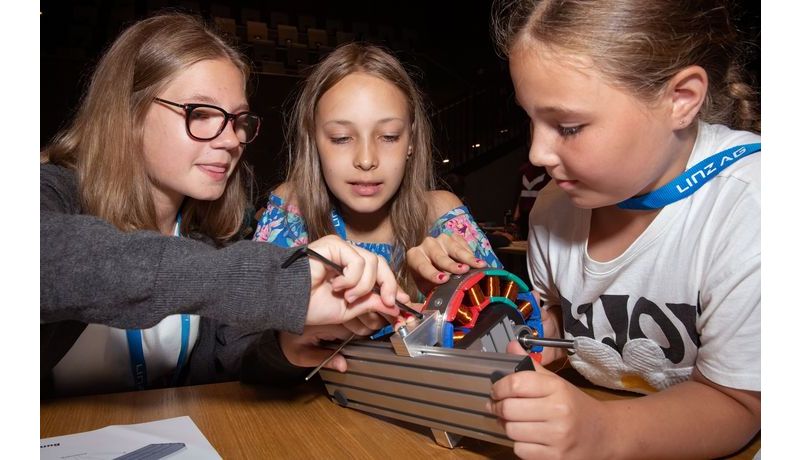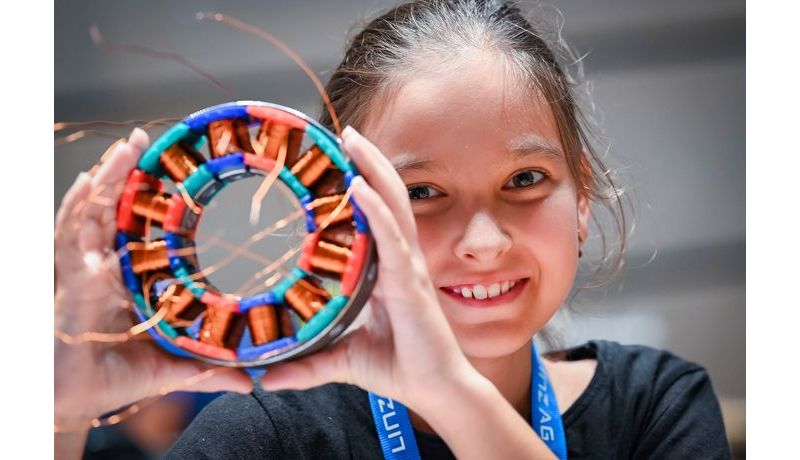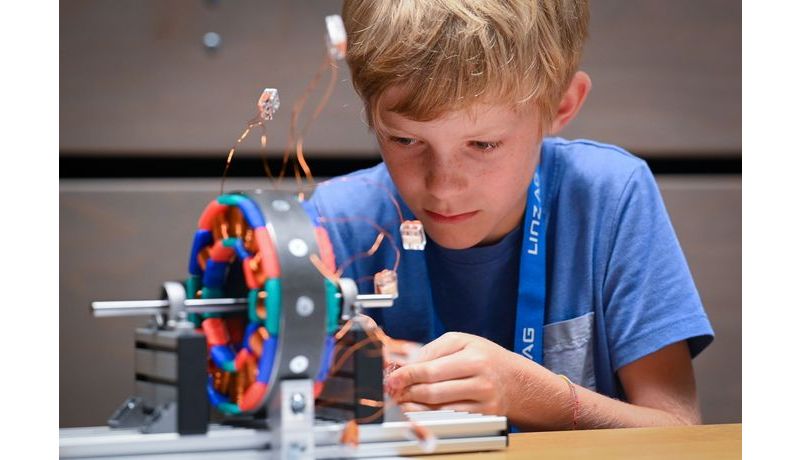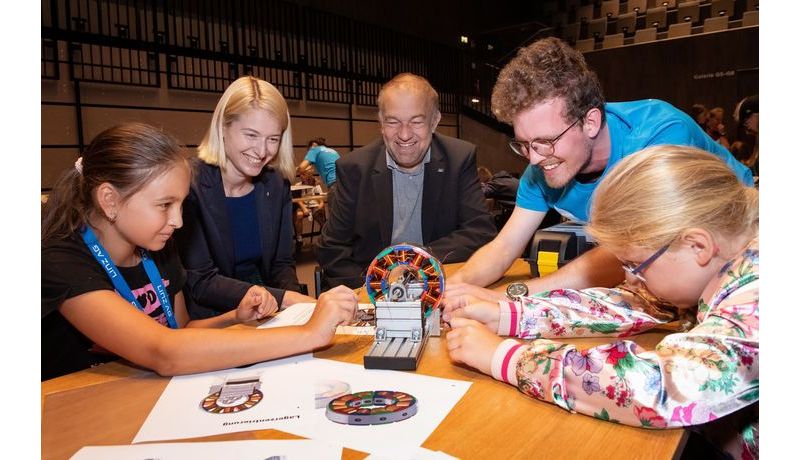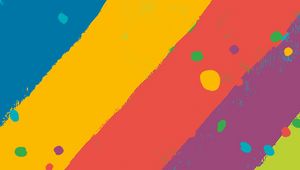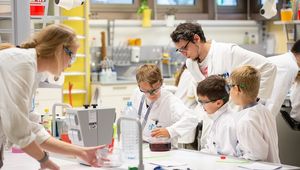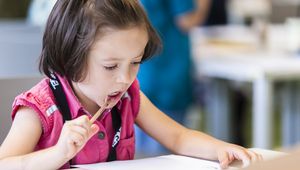Explore, discover, interact: 660 children have been bringing the JKU campus to life since July 11.
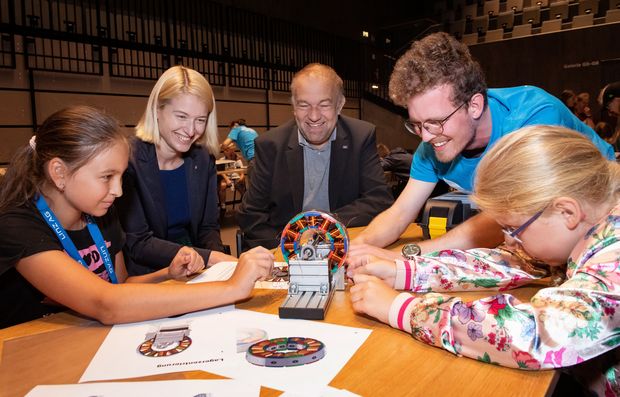
The 3rd annual JKU Science Holidays program has once again been a great success, hosting “junior researchers” between the ages of 6 and 14 on campus until August 5, and inviting them to discover science in a playful way.
JKU Rector Meinhard Lukas remarked: "Education and progress are rooted in curiosity. When given the space and incentives to do so, children discover the world in their own way. Most scientists have not only retained their childlike curiosity, it also serves as a driving force behind their research. During the JKU Science Holidays program, today's researchers come together with tomorrow's junior researchers, learning and having fun together as they explore different scientific topics. We have put together an exciting and diverse program of workshops, seminars, and daytrips. The children are between the ages of 6 and 14 and some of them are getting their first taste of campus life and learning first-hand about topics in natural sciences, engineering, law, medicine, business, social issues, and biology. Our doors are open and we explicitly welcome inquisitive children here!"
This year’s JKU Science Holidays program has been made possible by the Austrian Federal Ministry of Education, Science & Research, the OEAD (Agency for Education and Internationalization), and the Upper Austrian government.
Christine Haberlander, education officer and deputy governor of Upper Austria, experienced the JKU Science Holidays program for herself today during an on-site visit to the workshop "Electric Motors - The Power of Magnetic Fields": "I am pleased to see just how young Upper Austrians are developing a playful approach to science. This is where researchers of tomorrow can conduct experiments. The JKU’s summer Science Holidays program is innovative, not only generating added value for the children, but also helping parents with childcare during the summer."
Martin Polaschek, Minister of Education, Science & Research, noted: "The JKU Science Holidays program gives students an opportunity to learn during the summer and also get a taste of university life during summer vacation. This important initiative gives young people an opportunity to learn more about different areas of science, making it more tangible. Having easy access to science at a young age can also boost one’s confidence in science in the long run. This is a personal concern of mine as well, especially during a time when skepticism about science is at an all-time high in Austria. I hope the students enjoy discovering the many exciting facets of science and research."
High Demand
Under the direction of Bernadette Weinreich, educators and JKU workshop leaders have been supervising and mentoring 11 small groups of children (16 children per group) for a whole week since July 11 and until August 5. Once again, the demand for spots in the program was high and by the deadline, program organizers had received over 1,500 requests for spots in the program. 660 participants were randomly selected by lottery and allocated over a four-week period.
"The high demand for JKU Science Holidays program shows just how great the need is for high-quality childcare options. The children are allowed to fully discover how exciting science can be, right here at our campus.
We created the JKU Circus of Knowledge as an inspiring space for young and old alike to discover the world of science together with artists and scientists during events and workshops held throughout the year," said Rector Meinhard Lukas, himself a frequent visitor of the JKU’s Circus of Knowledge.
The Brightest Minds at the JKU Give It Their All
Some 30 JKU scientists and scholars in a wide range of disciplines are actively involved in workshops and courses during the JKU Science Holidays program. One of them is Florian Poltschak, head of the JKU HOERBIGER Research Institute for Smart Actuators, who, together with his team, created a workshop titled "Electric Motors - The Power of Magnetic Fields":
Florian Poltschak remarked: "Not only because of e-mobility have electric motors become a part of everyday life. While e-motors are part of a good driving solution, they remain largely invisible, resulting in this type of technology - which is essential in energy transition – being considered some kind of inexplicable ‘mystery’. This workshop makes electric motors tangible in the truest sense of the word. Using basic building blocks, the kids can build and test their own motors, thereby exploring various properties. When the children experience the power of their own handmade motor and their eyes light up, their enthusiasm for research and technology has been sparked."
JKU Rector Meinhard Lukas greatly appreciates the dedication and commitment: "I am delighted to see just how many of our JKU scientists are involved in the Science Holidays program. Together with many junior scientists in a wide range of disciplines, leading researchers have once again dedicated themselves to developing original workshops. This enables us to offer exciting summer holidays and give the kids age-appropriate insight into the world of science."
In addition, the JKU has hired 21 trained educators - and those in training - to provide professional childcare during the entire period. They supervise and look after the children during the JKU Science Holidays program.
Healthy Snacks for Junior Researchers
The JKU Mensa is once again providing lunch this year. Junior researchers can choose daily between two different menus (1x meat, 1x vegetarian option) with soup, salad, and a beverage. In addition, fruit and müsli bars are available during the afternoons.
External partners include the Linz Zoo, the Ars Electronica Center, the Red Cross and the Samaritan Association, Academia Superior, the Upper Austrian Soccer School, Adventure Management, Maguel the Magician, the Canoe Polo and Quidditch Club, the Grünschnabel Club, Mural Harbor, the Austrian Space Forum, Linz AG, and the Vitalakademie. Sponsorship by the Linz AG in the amount of € 500 has made it possible to use public transportation system for daytrips, some of which is free of charge.
The 2022 JKU Science Holidays Program – Facts & Figures
- 1,500 applications
- 660 children over a four-week period (165 children a week)
- Spots were filled by a drawing
- Full-day childcare (including meals): Monday to Thursday, 8.00 AM – 4.00 PM and Fridays from 8.00 AM - Noon
- Each child can take part for a maximum of 1 week and is assigned to a group for the entire week
- Small groups of a 16 children max. in four age groups from ages 6 to 7, 8 to 9, 10 to 11, and 12 to 14
- 21 qualified educators (or educators in training) to supervise the children
- 70 different workshops offered by JKU faculty members and external partners, some of which are offered more than once
- 396 workshop dates and daytrips
- Over 15 external partners
- Parental fee: € 50 per child for the week, including lunch, materials, and entrance fees
- 100 children are eligible for a scholarship to take part for free (25 spots per week)
Some of the Highlights from the 2022 JKU Science Holidays Program
"Electric Motors - the Power of Magnetic Fields!"
Electromobility is an important issue today. There is a great deal of research in science today as to how these motors can best be constructed and operated. This workshop introduces you to the parts that make up an electric motor and how the individual parts influence its properties. Using a construction kit, you will assemble an electric motor based on your own ideas, operate it, and study it extensively.
Heroes of the Green World – We Don’t Need Plastic
We take a walk through a house in our minds, tracking down the plastic and talking about what plastic is. As part of a discussion and in small groups, we talk about alternatives. To round things off, each child will make his/her own play slime or magic sand to demonstrate that there are natural alternatives to the toys we often buy (most of which are reinforced with plastic).
A Treasure Hunt Using all of our Senses
We are hunting for treasure at the JKU. Secret messages have been hidden all over campus, messages that will lead us to the treasure. Using all of our senses, we will decode the messages together and if we all pull together, we will surely find it!!
Harry Potter: Lessons at Hogwarts
Professor McGonagall is not amused. Strange events are keeping the students at Hogwarts on their toes. Help us find the culprit by conducting fantastic experiments and learning how to conjure snakes, turn copper into gold, and travel on the flue network in magical trials. See you at Hogwarts, the School of Witchcraft and Wizardry.
Build a Rocket
Learn all about space travel and rockets: How does a rocket work? How far away is space? What can you eat there? Together we will build our own solid rockets and launch them using electric ignition and a solid propellant to reach a flight altitude of approximately 100 meters. The firing speed is about 400 km/h. At the highest point, the rockets ignite a second propellant charge which is then used to eject a parachute where the rockets will land again. The rockets can also be launched several times.
Shadow Theater "MoonDream & PlanetSound".
Twins Jo and Jo travel to the past with a strange traveling companion and meet the famous naturalist and astronomer, Johannes Kepler. They follow him through his troubled life: He changes jobs and homes several times, living Graz, Prague, and Linz (where he stayed the longest). But times were also turbulent: Displacement, war, his mother was accused of being a witch and he had to defend her. Nevertheless, Kepler persisted and conducted his research. He found, for example, that the planets do not move in circles around the sun, but in ellipses. Astronomy was his specialty, but he was also curious about other things. What do snowflakes look like? How does an image form in the eye? How can you best stack spheres?
How to Bend Light to Find the Aliens
How do you take a focused picture of space? Giant telescopes use so-called "adaptive optics systems” to prevent atmospheric turbulence from affecting the image quality of the universe they capture. This works with elastic mirrors that adapt very quickly to turbulence, "bending" the light waves disrupted by turbulence and getting them back into shape. Controlling these mirrors is an extremely tricky mathematical problem....
A Visit to the Ars Electronica Center
Have you ever taken a peek into your future? At Linz's Ars Eletronica Center, you will get a guided tour of the Museum of Art, Technology & Society. This is where we try to look into the future and get a glimpse of what the digital revolution might have in store for us. You will also be immersed in "Deep Space 8K" for half an hour and experience a 16-by-9 meter long wall and floor projection, laser tracking, and 3D animations. This experience is only available here in the world.







